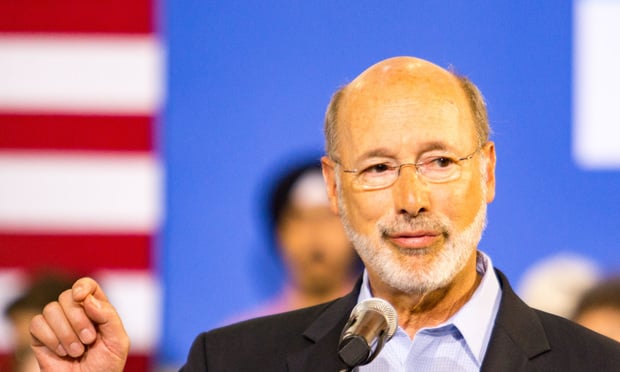According to court watchers, the recent federal court ruling finding several restrictions Pennsylvania Gov. Tom Wolf imposed to combat the COVID-19 pandemic were unconstitutional is an outlier—with regard to both pandemic-related litigation and longstanding precedent.
But it might not remain that way for long, as some legal observers see the court’s sweeping language as legitimizing rarely seen judicial second-guessing and potentially emboldening like-minded judges to rule similarly.
On Monday, U.S. District Judge William Stickman of the Western District of Pennsylvania determined that Wolf’s orders shutting down “non-life-sustaining” businesses and placing restrictions on gatherings violated the First Amendment, as well as the due process and equal protection clauses of the 14th Amendment. The decision, which the governor’s office has said it will appeal, entered judgment for several counties, businesses and state officials who are challenging the shutdown orders.
Stickman’s ruling delved into the decisions underlying the orders and ultimately found that the challenged provisions were not sufficiently narrowly tailored and were arbitrary. Additionally, the judge said the orders crossed the lines of what is constitutionally permissible, even in response to a public health crisis.
“The court recognizes that defendants were facing a pressing situation to formulate a plan to address the nascent COVID-19 pandemic when they took the unprecedented step of sua sponte determining which businesses were ‘life-sustaining’ and which were ‘non-life-sustaining,’” Stickman said. “But in making that choice, they were not merely coming up with a draft of some theoretical white paper, but rather, determining who could work and who could not, who would earn a paycheck and who would be unemployed—and for some—which businesses would live, and which would die.”
According to court watchers, the opinion stands out from recent rulings from other jurisdictions dealing with state responses to the pandemic. Although there have been many attempts to broadly strike down some closure measures, observers say those challenges have been repeatedly rejected by the district courts, and only granted in situations where the challenges were based on specially protected rights, such as the right to worship.
“There have been some decisions, but I think none as broad as this,” Thomas King of Dillon McCandless King Coulter & Graham, who represented the plaintiffs, said Monday following the release of the opinion. King added that the decision could provide guidance to other courts looking into similar issues. “I think it’s an excellent opinion by Judge Stickman. He has correctly cited the law in support of the opinion. I think it’s very sustainable on appeal.”
However, not all legal observers would agree.
According to constitutional law professors, there are several grounds on which the U.S. Court of Appeals for the Third Circuit could reverse Stickman’s decision, one of which stems from the sweeping nature of the opinion.
Craig Green of Temple University’s Beasley School of Law said the ruling does not appear to be sufficiently specific and tethered to the underlying events, which could allow the Third Circuit to reverse. As an example, he noted that Stickman’s decision at one point notes that several months have passed since the orders came down, suggesting that the measures may no longer be reasonable.
“That suggests that at some vague moment, I don’t know when it was, these policies drifted out of the creditworthiness of [the initial time of the pandemic],” Green said. “There are a variety of justiciability issues that could allow them to reverse the opinion and deprive it of legal force. There are very, very legitimate legal grounds to do that.”
Green said he is hopeful the ruling will be reversed on appeal, saying there was a “judicial aggressiveness” to the ruling that he found “troubling.”
Both Green and Stetson University law professor Louis Virelli said Stickman’s opinion can be read two ways—one of which holds that Wolf’s orders were so flawed as to be unconstitutional, while another, more broad reading indicates that the measures Wolf took were simply unconstitutional under any circumstances.
Both also said that the broad reading of the opinion shows a willingness by Stickman to second-guess government agencies that goes against longstanding precedent in which courts leave policy-making decisions to the legislative and executive branches.
“It shouldn’t really be a particularly difficult constitutional question to say our elected officials have the ability to try to protect us from a pandemic, even if they do not employ the same [means] we would choose to ourselves. And the constitution allows for that,” Virelli said. Telling elected officials they cannot address health issues the way they see fit, “That would be an expansion of the constitutional doctrine. That would be unusual.”
Virelli did not wade into whether he thought the Third Circuit would or should not reverse the decision, but he said the ruling took an “unforgiving” approach when it came to the standards of review, which, he noted, are deferential toward the policy makers.
Virelli also noted there were other unusual moves by Stickman as well, including his decision to rule on provisions that Wolf has since suspended. Typically, in those circumstances, courts decline to wade into issues that are no longer in dispute, Virelli said, noting that earlier this year the U.S. Supreme Court dismissed a Second Amendment case from New York on those grounds.
“It doesn’t seem necessarily like a great fit to me here, but certainly it’s within the judge’s prerogative,” Virelli said.
According to Virelli, district court opinions are often written in ways that they can be read both broadly and narrowly by circuits and other district courts handling similar issues, and Stickman’s ruling, he said, could have significant impacts for other jurisdictions.
“Where an opinion like this can have future consequences is if it’s an invitation to other judges to react similarly in similar situations, if judges take it as emboldening them to say [to policy makers] ‘you’ve gone too far,’” he said.
Green said he viewed the opinion as legitimating a view that courts should be on the front lines of public health crises, second-guessing the policy makers’ decisions, which, Green said, goes against a century of precedent.
“It legitimates a certain kind of resistance to pandemic policy,” he said, echoing sentiments by Virelli that the ultimate group that should be holding policymakers accountable on those decisions is the voters, rather than the courts. “Those issues should be fought out in the streets of politics, not the chambers of the courtroom.”
NOT FOR REPRINT
© 2024 ALM Global, LLC, All Rights Reserved. Request academic re-use from www.copyright.com. All other uses, submit a request to [email protected]. For more information visit Asset & Logo Licensing.

 Pennsylvania Gov. Tom Wolf. Photo: George Sheldon/Shutterstock.com
Pennsylvania Gov. Tom Wolf. Photo: George Sheldon/Shutterstock.com








